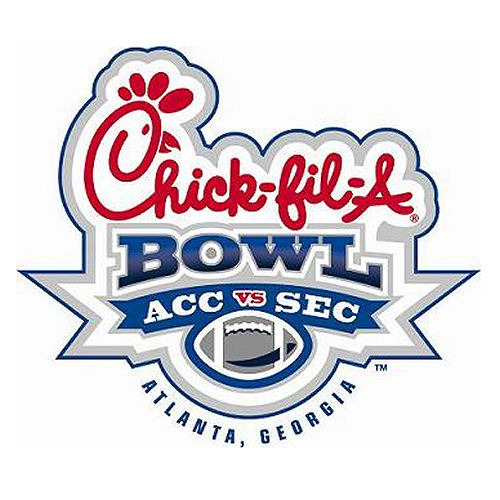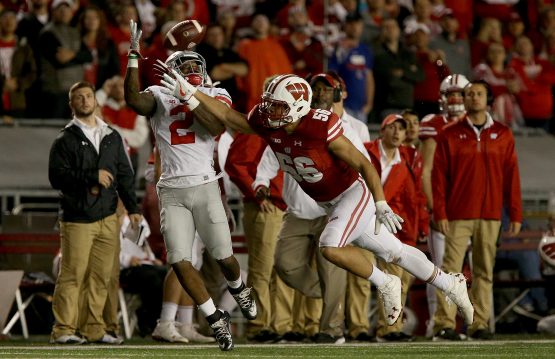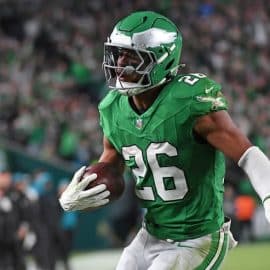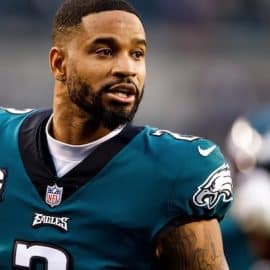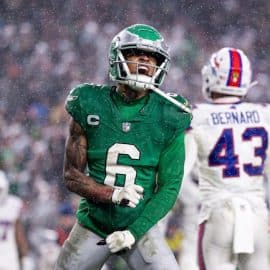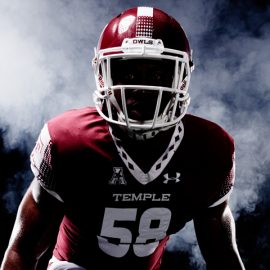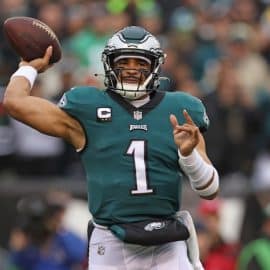It's not talked about much, but how a head coach interacts with the various referee crews thrown at him over the course of a season counts for a lot.
Chip Kelly has the daunting task of establishing a good working relationship with NFL refs— and pronto— which will be a big factor in getting the occasional favorable call or non-call.
It's a winning difference, and I'm shocked that more fans and writers don't give it enough play.
The term referee, when used to describe NFL officials, is a bit of a misnomer since technically there is only one referee on the field. The other officials are the umpire, head linesman, side judge, back judge, side judge and the field judge. Each of these "referees" has a specific job to perform during the course of an NFL game.
Referee
-
In the NFL the referee is also known as the head referee or the crew chief. He wears a white cap while the other officials wear a black one. The referee's responsibilities are many and include announcing every penalty and explaining them to the captain of each team. The referee will also speak to the coaches about calls made on the field. As far as actual play the referee stands about 10 yards behind the quarterback and looks for illegal hits from the defense against the quarterback and for illegal blocks in the quarterback's vicinity. The referee will call for the yardage chains when a measurement for a first down is necessary. Tough calls such as whether a forward pass was actually a fumble are the referee's job and in an NFL game the referee will look at disputed plays on a special replay monitor and have the final say on if the call is upheld or overruled.
Umpire
The umpire has the most dangerous job of all the referees in the NFL. This is because they must stand 5 yards from the line of scrimmage and are on the defensive side of the ball in the middle of the action. Umpires are often run into and run over, making alertness especially prudent on their part to avoid injury. The duties of the umpire include making certain the offense has only 11 men on the field of play, watching for holding on the line of scrimmage, looking for illegal players downfield during passes, and helping the referee make calls involving possession of the football. When the ball is dead the umpire keeps track of all scores, timeouts, and even wipes the ball between plays on rainy days.
Head linesman
The head linesman's concerns are mostly around the line of scrimmage. This referee is on one of the sidelines right at the line and looks for offsides or encroachment by defensive players. The head linesman will mark the forward progress of a ball carrier and monitor all eligible receivers. Illegal motion, shifts and use of hands are all calls made by the head linesman.
Line Judge
Lining up on the other side of the field from the head linesman is the line judge. This referee aids the head linesman in making calls such as illegal motion and offsides. They also will assist the head referee when it comes to calling false starts on offensive players. An important function of the line judge is to make sure that when attempting a pass that the quarterback does not stray beyond the line of scrimmage before doing so. On punts the line judge keeps track of offensive lineman heading down the field of play too early and they are the supervisors of the timing of the football game. They also monitor substitutions from teams located on their side of the field.
Back judge
The back judge will be 20 yards deep in the defensive side of the ball on the wide receiver's side. They count defensive players to make sure there are no more than 11 and watch eligible receivers on their side of the playing field. Possession on catches, whether the player was inbounds, and pass interference all fall within the domain of the back judge. They look for clips on kick returns and on field goals and extra points they position themselves under the goal posts and rule on if the kick was good or was missed. The side judge will have the same responsibilities as the back judge but they line up 20 yards deep down the same side of the field as the head linesman.
Field judge
The field judge goes 25 yards deep into the defensive backfield but on the tight end side of the football. From there they will watch the play clock and make delay of game calls. They also count defensive players and make rulings on balls crossing the goal line on touchdowns. They observe eligible receivers on their side of the field and make rulings on catches and pass interference. The field judge marks where a play goes out of bounds on their side of the playing field and also calls illegal use of hands on receivers and defensive backs as well.
There's not much data out there on which head coaches get the best results from officiating. I'm sure it's a whole new frontier of statistical study. But as fans we can feel it. Some head coaches seem to be able to work the refs for better calls.
Officiating can be an emotional subject for NFL head coaches. Pivotal calls that hurt their teams can remain fresh in their memories for years. In extreme cases, a botched call can contribute to a coaching staff's demise.
There WAS one study done by sports psychologists back in 2008. They were commissioned by ESPN, and they wanted to find out who were the refs who got the most respect from the head coaches as a whole.
One prominent head coach offered a terse response when ESPN.com asked him to name the two best referees in the game.
"None of them," the coach huffed.
The response wasn't particularly surprising, but it wasn't the norm, either. Twenty-two of the 32 NFL head coaches named names when asked the question during a wide-ranging ESPN.com survey. Fifteen head coaches named at least one official when asked to single out the worst referees in the game. (Coaches were given anonymity for their candor.) The results were as mixed as the coaches' experiences with various officials presiding over their games.
Mike Carey and Ed Hochuli, two of the most familiar referees, commanded the most positive votes, with eight apiece. None of the other 15 regular referees who worked games in 2007 commanded more than three votes of support from coaches.
Hochuli, an Arizona trial attorney with Brizerian-workout musculature and post-call explanations precise enough to hold up in court, has worked several Super Bowls since becoming a referee in 1992. Carey, a former college running back whose company manufactures snow-skiing accessories, is one of two African-American referees and the first to work a Super Bowl.
"The guys that I think are really good, and I must say that most of our guys are really good, they don't impose themselves on the game," said Dick Jauron, who declined to name referees for the survey. "You don't necessarily notice them. The game is under control. And when there are any issues, they get to you quickly and they explain them, and they explain them in a way that you understand."
The league in recent years has asked officials to explain their rulings more thoroughly, for the benefit of coaches and fans. The idea is to eliminate confusion while instilling confidence in the referee, his crew and the process. Beyond seeking officials who get calls right, league officiating director Mike Pereira also looks for referees with strong leadership skills and the ability to project confidence.
"How does he go about preparing the crew?" Pereira said. "Does he focus on the negative or does he focus more on the positive? Those aspects are extremely important to me.
"And then the one that I also can't deny is, what does he project? How does he project himself when the camera is on and when the microphone is on? I do believe that if people have confidence in the referee, then they have confidence in the whole crew."
Coaches' confidence in Hochuli and Carey went only so far. Despite their 16 combined positive votes, both also generated more negative responses than every official but one. Gerald Austin, who was headed for retirement after 26 years as an NFL official and 18 as a referee, finished with a league-high six negative votes. No head coach listed him among the best referees back in that 2007 survey.
Austin's crews assessed a league-low 8.9 penalties per game in 2007. Austin also averaged twice as many replay reversals per game as the other referees. Coaches won 11 of 14 challenges against Austin that season, easily the highest reversal rate among referees (the league average was less than 37 percent).
"To me, the guys that are consistent, call everything the same way every time, and the guys that will explain to you what happened, that is what I like," said former coach Tony Dungy, who did not name the referees he considered the worst. "And most of our guys are that way."
Four coaches ranked Hochuli among the worst referees. Three ranked Carey among the worst. Triplette (three), Larry Nemmers (two) and Bill Leavy (one) also drew negative votes.
Three head coaches listed Tony Corrente and Bill Carollo among the best referees. Leavy, Nemmers and Walt Coleman each drew two positive votes. John Parry, a first-year referee in 2007, received the other positive vote.
Mike Shanahan said he values officials who hold up well under pressure.
"The main thing is how he operates and how he functions during a game," Shanahan said. "Some guys communicate very well to the coach; other guys communicate very well to the players. The bottom line is, does a guy do a good job? Does he call a good game? And that is the key — not how he communicates with a coach or with a player. Does he make the right calls?"
I am intrigued with how the Chippah goes about securing a good working relationship with the officiating crews. Does he patronize them with inside knowledge of their families and friends? Does he taunt them to do a better job? Does he congratulate them for favorable calls? Does he try to smart-aleck them with his knowledge of the rule book? Does he snap if a call goes against him? Or does he sympathize with them when a tough call goes the wrong way?
Just another reason this is an exciting Eagles season coming up— no matter what. I can't wait to see how Kelly handles the refs.
Add The Sports Daily to your Google News Feed!
